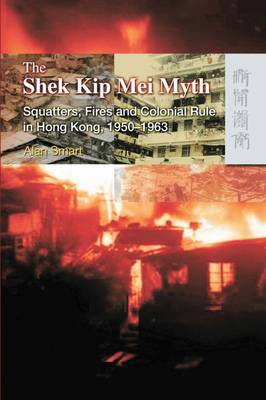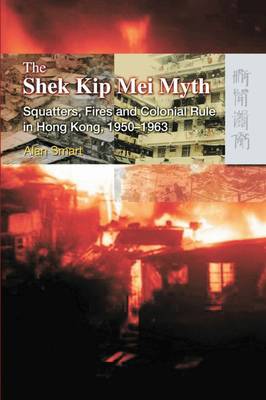
Door een staking bij bpost kan je online bestelling op dit moment iets langer onderweg zijn dan voorzien. Dringend iets nodig? Onze winkels ontvangen jou met open armen!
- Afhalen na 1 uur in een winkel met voorraad
- Gratis thuislevering in België vanaf € 30
- Ruim aanbod met 7 miljoen producten
Door een staking bij bpost kan je online bestelling op dit moment iets langer onderweg zijn dan voorzien. Dringend iets nodig? Onze winkels ontvangen jou met open armen!
- Afhalen na 1 uur in een winkel met voorraad
- Gratis thuislevering in België vanaf € 30
- Ruim aanbod met 7 miljoen producten
Zoeken
The Shek Kip Mei Myth
Squatters, Fires and Colonial Rule in Hong Kong, 1950-1963
Alan Smart
Hardcover | Engels
€ 29,45
+ 58 punten
Omschrijving
Alan Smart raises serious questions about the standard view that Hong Kong's mass public housing programme was a direct and humane response by the Government to the Shek Kip Mei fire. Rather he argues that the Government's response to that fire was grudging and incremental rather than a sharp and radical turning point, and that the security and stability of Hong Kong weighed as heavily, possibly more so, in the decisions than the predicament of the fire victims. His research shows that a whole sequence of major fires after Shek Kip Mei, and the political costs of the Mainland sending comfort missions to fire victims both before and after were needed to bring about the final commitment to provide mass public housing. In his critical examination of the conventional position, Professor Smart bases his case on a thorough reading of government records and provides a careful investigation into the origins of the public housing policy in Hong Kong. This volume makes an important contrarian contribution to the postwar history of Hong Kong and is a significant addition to the study of its modern development.
Specificaties
Betrokkenen
- Auteur(s):
- Uitgeverij:
Inhoud
- Aantal bladzijden:
- 256
- Taal:
- Engels
Eigenschappen
- Productcode (EAN):
- 9789622097926
- Verschijningsdatum:
- 11/07/2006
- Uitvoering:
- Hardcover
- Formaat:
- Genaaid
- Afmetingen:
- 137 mm x 250 mm
- Gewicht:
- 576 g

Alleen bij Standaard Boekhandel
+ 58 punten op je klantenkaart van Standaard Boekhandel
Beoordelingen
We publiceren alleen reviews die voldoen aan de voorwaarden voor reviews. Bekijk onze voorwaarden voor reviews.











